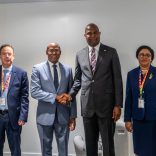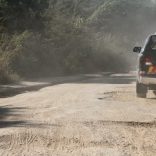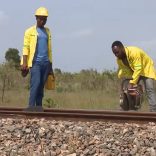Mozambique: President Chapo wants a new era of cooperation with Bretton Woods institutions
World Bank detects threats to Mozambique’s economy

DW
Despite the incipient recovery, Mozambique’s economy is at risk because of the high dependency of the extractive sector and fluctuations in raw material prices.
In its ‘Africa’s Pulse’ report, the World Bank notes that a possible reduction in the prices of export products, including aluminium and coal, could seriously affect Mozambique’s export revenues, of which more than 80 percent depend on mega-projects.
The institution proposes better tax collection, given the high of state budget deficit and difficulties in the restructuring of public debt.
In a report released in the US capital Washington, the World Bank acknowledges however that the Mozambican economy is improving, citing growth in gross domestic product of around 2.9 percent in the first quarter of this year, double that of 2016.
The national currency, the metical, recovered 28 percent of its value against the dollar in the last nine months of this year and the rise of the general level of prices has slowed down.

Official optimism
Earlier this week, Prime Minister Carlos Agostinho do Rosário said that although the current situation represented a challenge, the country was responding positively to the macroeconomic production incentive measures.
“The pace of recovery of our economy leads us to project economic growth of 4.7 percent in 2017,” he said, pointing to a reduction in inflation from about 26 percent in November 2016 to 14 percent in August.
The economic recovery, he said, was the result of the country’s peace, the implementation of fiscal and monetary policy measures, and increased production and productivity, particularly in the agricultural sector.
Measures to be taken in Africa

The World Bank report on sub-Saharan Africa projects moderate growth of 2.4 percent this year against 2.3 percent in 2016. “The good news is that Africa is recovering from the worst situation it has experienced in two decades,” World Bank chief economist for Africa Albert Zeufack said.
Zeufack said it was “imperative that African countries adopt adequate fiscal policies and structural measures now, in order to strengthen economic resilience, increase productivity, increase investment and promote economic diversification”.
Human resources a priority
World Bank economist David Evans argued that to reduce poverty and foster inclusion, sub-Saharan African countries should focus more on human resource skills. Evans pointed to the area of education as an example.
Figures in the report indicate that in Africa one in three children fails to complete primary schooling. In most countries fewer than 50 percent of children complete secondary education and less than 10 percent have access to universities.
“Most teachers with whom I have interacted in a number of countries have a strong desire to teach well, but lack continuous training. They have the requisite qualifications, but they need more motivation to teach effectively. We need to focus on quality teachers,” Evans said.












Leave a Reply
Be the First to Comment!
You must be logged in to post a comment.
You must be logged in to post a comment.